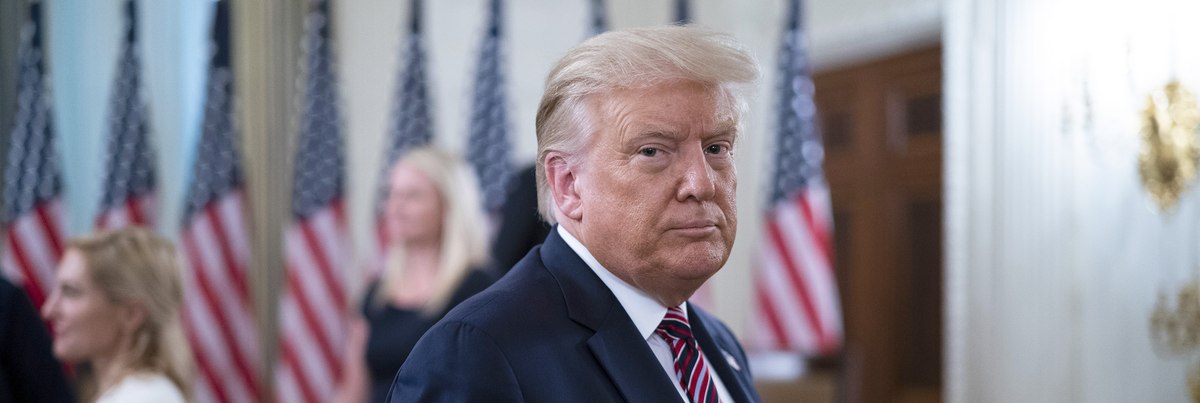The trial and acquittal of former President Donald Trump for his actions before and during the January 6 takeover of the U.S. Capitol has left most Americans unsatisfied and divided. Nearly as many in the latest Economist/YouGov poll believe he should not have been impeached at all (42%) as believe impeachment was the right thing to do (48%).
However, by a 15-point margin, the public believes President Trump should not be allowed to run again — though Congress dismissed the opportunity to permanently disqualify him. Partisanship dominates opinion on these questions. Just 10% of Republicans would keep the former president from running, about the same percentage who disapprove of his acquittal by 43 Senate Republicans.
Opinion on whether President Trump should be allowed to run for president again is closely related to whether one sees anything wrong in his actions on and before January 6. Nine in ten Americans who say he did something wrong on January 6 (90%) believe he should not be allowed to run again, while nearly as many of those who think the opposite (85%) believe he should be allowed to try again.
By 51% to 37%, the public believes that President Trump did do something wrong before and during the takeover. Democrats (87%) are especially likely to say President Trump did something wrong, but just 14% of Republicans agree. Three-quarters of Republicans (76%) believe he did nothing wrong.
Many dispute that Capitol rioters were mostly Trump supporters
It is striking that many Americans don’t think the Capitol rioters were in fact supporters of the then-President. For one in four (24%) – and for half of Republicans (49%) – those who stormed the Capitol were not doing it to support President Trump. Three in five Americans (59%) believe he people who took over the Capitol on January 6th were mostly supporters of Donald Trump.
Many believe there was no real risk to Congress itself during the attack (31%). While more than half the public overall (54%) agree that the members of Congress were in danger that day, 61% of Republicans disagree and say that wasn’t truly the case.
Despite the high stakes, a third of Americans paid no attention to the impeachment
One in three Americans (34%) paid no attention to the impeachment, neither watching any of the House and Senate activities nor watching or reading clips and articles about it.
Two in five (43%) claim they have no idea how their own two Senators voted in last week’s trial. Democrats paid more attention to what took place than Republicans did, and Democrats were a bit more likely than Republicans to report how their Senators voted. 44% of Republicans did not follow the impeachment compared with only 17% of Democrats. Two in five (41%) Republicans couldn’t say how either of their state’s Senators voted, compared with one-third (34%) of Democrats.
Of course, as it requires a two-thirds vote to convict someone who has been impeached, perhaps Saturday’s outcome was predetermined. But it did impact opinions of some key figures. Wyoming’s Republican Congresswoman Liz Cheney, a member of the House leadership, voted for impeachment. Republicans now have an unfavorable opinion of her (48% to 20%), with Trump voters unfavorable by an even greater 58% to 14% margin.
Two GOP Senators who opposed impeachment, Josh Hawley of Missouri and Ted Cruz of Texas, receive favorable ratings from Republicans. By 44% to 16%, Republicans have a favorable opinion of Hawley; by 68% to 15%, they view Cruz favorably.
As for President Trump, most Republicans remain loyal to him, but the overall assessment of him is poor. While in office, Trump’s approval rating hovered at or just above 40%, and last week, 46% of the public chose him as the worst President in history. This week, nearly as many believe history will regard him as a below average (43%) or poor (10%) president.
Men are noticeably more likely than women to think Trump has been a poor president. The gender difference isn’t simply due to the fact that women in this poll are ten points more likely than men to call themselves Democrats. Within each party group — Democrats, Independents and Republicans — women are more negative than men in their view of how history will judge Trump (although the difference is within the margin of error among Republicans).
See the toplines and crosstabs from this Economist/YouGov poll
Methodology: The Economist survey was conducted by YouGov using a nationally representative sample of 1,500 US Adult Citizens interviewed online between February 13 - 16, 2021. This sample was weighted according to gender, age, race, and education based on the American Community Survey, conducted by the US Bureau of the Census, as well as 2016 Presidential vote, registration status, geographic region, and news interest. Respondents were selected from YouGov’s opt-in panel to be representative of all US citizens. The margin of error is approximately 2.9% for the overall sample
Image: Getty







